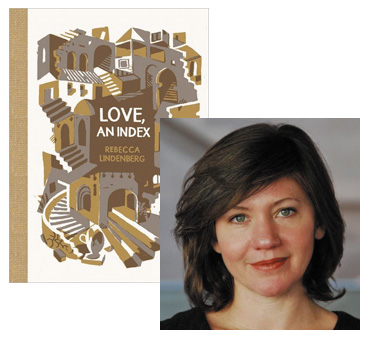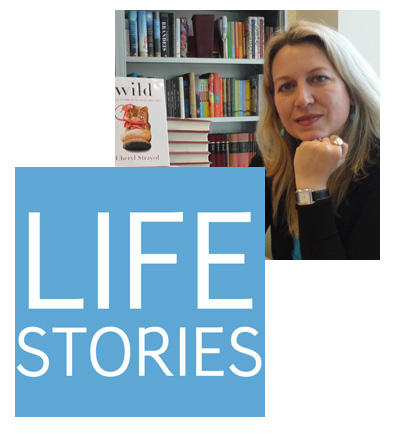Rebecca Lindenberg: The Magic of Craig Arnold’s Poetry

Love, An Index is the first collection of poems by Rebecca Lindenberg, and it depicts her relationship with another poet, Craig Arnold, who disappeared in 2009 while hiking on the Japanese island of Kuchinoerabujima, where he was conducting research for a book of poems about volcanos. As she told The Believer, Lindenberg was well into the writing of the poems when Arnold vanished, “at that stage, as you can imagine, the direction of the book changed dramatically, as did my feeling of urgency about it.”
Lindenberg’s verse takes on a variety of forms in its encyclopedic examination of the emotional impact of losing a loved one, and of trying to carry on. Private lexicons, footnotes without an anchoring text, collected quotations, Facebook status updates—no one style can contain her grief, or her joy, or her memories. I was so glad when she agreed to be the first poet in far too long to contribute to Beatrice‘s “Poets on Poets” series, and the insights she brings to Arnold’s poems in the essay that follows are powerful.
I have, in my life, many vital poetic influences. The effortless, energetic intelligence of Frank O’Hara, who moves so easily between erudition and emotion, between intimacy and spectacle, and who teaches me so much about how poetry—given a certain kind of permission—can play; D.H. Lawrence, who seems to hold a kind of arch lyricism in one hand and an almost grueling candor in the other; Anne Carson, whose writings define and defy genre, steeped equally in the profound mythic resonances of Classical scholarship and the serious whimsy of Gertrude Stein; C.D. Wright, whose infinitely inventive projects include some of the move evocative and muscular writings from a place of female physicality that I’ve ever read; the mad mystical intensity of Hart Crane; the fragmented ecstasies and invocations (and arguments) of Sappho; I feel I could go on and on.
I’m deeply influenced by magnificent teachers, some of whom could twist each other into paroxysms of disagreement, and I am influenced by my own negotiation of their disagreements. But for almost a decade I shared the central conversation about poetry in my life with a man who was first my friend, then my beloved partner, and always my favorite interlocutor on the subject, the late Craig Arnold, and it’s his work I wish to consider for a few moments here.
Craig’s first book, Shells, was chosen by W.S. Merwin for the Yale Series of Younger Poets Prize, and Merwin praises Craig’s work, “in [its] unwavering fidelity to pleasure, a kind of affectionate confidence in enjoyment, in both the running chatter and the irrational magnetic rightness of the senses.” And of course, that’s true—Craig was, as a poet, in enduring search of experience, in the most elemental sense you can conjure for that word. And language, for Craig, was a sense as visceral as touch or taste with which to feel the world, and feel himself moving through it.
This place, the border of the self, was where Craig lived and wrote. But it is a place of incandescent hypersensitivity, and so it is a tenuous, dangerous, volatile place. I think in Shells, Craig was trying to understand this place and in so doing, found himself often retreating from it, or trying to raise the poem as a kind of force-field before it. To my mind, one of the great gifts of Shells is the exploration of personae and performance they include—there’s something almost Browning-esque in these pieces.
They are a collection of monologues and soliloquies that perform aspects of the self, each one a little larger than life—the playful bravado of “The Power Grip,” a poem in which a male friend gives the rapt speaker some misguided pointers (literally) for cunnilingus, or the confident imperatives of “Scrubbing Mussels,” or the almost-burlesque confessions of “Why I Skip My High School Reunion” are all Craig, but they are “life plus ten percent,” as George Saunders might say. Poems like “Locker Room Etiquette” and “Great Dark Man” investigate the relationship between gender and performance—when is it masculinity? When is it masculinity plus ten-percent? Even, to some extent, the formal dexterity of these poems puts on a kind of show. It is perhaps in the long, beautifully-wrought narrative couplets of “Hot” that we come closest to understanding and seeing the machinations of this book—a story of a man who wanted so badly to feel more, more, more, he hurt himself beyond the capacity to feel at all.
18 April 2012 | poets on poets |
Life Stories #5: Cheryl Strayed
In this episode of Life Stories, my podcast series of interviews with memoir writers, I talk with Cheryl Strayed, the author of Wild: From Lost to Found on the Pacific Crest Trail. We talked about the personal circumstances that led her, in the mid-1990s, to make a solo hike from the Mojave Desert to the Oregon-Washington state line, and what she learned about herself when she decided a decade later to write about that experience. We also talked about Strayed’s recently revealed status as the author of the “Dear Sugar” advice column at the literary website The Rumpus, and whether anonymity was liberating, in terms of being able to take creative risks with her writing voice:
“I think at first it was, because I did have some doubts; I thought, ‘Well, who am I to give anyone advice?’ And I thought that if I completely bombed at it that nobody would ever have to know that it was me. But once I started doing well with it, I did feel like the anonymity was getting in the way. A lot of readers who wanted me to stay anonymous would say, ‘I fear that once you’re no longer anonymous, you won’t feel as free to write as intimately as you do. And, of course, I knew the sort of stuff I was writing as Cheryl Strayed was very open and intimate, and I would say, ‘No, no, trust me.’ …
There were some things I couldn’t quite write about because it would just give it away so much to anyone who’d read my work. And so many people who had read my work, by the end, were guessing. I would say hundreds of people by then had written to me to say ‘You must be Dear Sugar.’ So it was really high time to come out, because it was one of those things everyone who knew kept a secret but inevitably… somebody was going to make a tweet and say, ‘I know it’s Cheryl Strayed.’ So I came out right when I felt like it would have all come out anyway, and it hasn’t changed my relationship to the column whatsoever. I feel like I still will write it the same way, with the same freedoms and constraints that I always have.”
Listen to Life Stories #5: Cheryl Strayed (MP3 file); or download the file by right-clicking (Mac users, option-click).
(And to learn a bit more about Wild, see my write-up for USA’s Character Approved blog…)
7 April 2012 | life stories |


 Our Endless and Proper Work is my new book with Belt Publishing about starting (and sticking to) a productive writing practice.
Our Endless and Proper Work is my new book with Belt Publishing about starting (and sticking to) a productive writing practice. 
